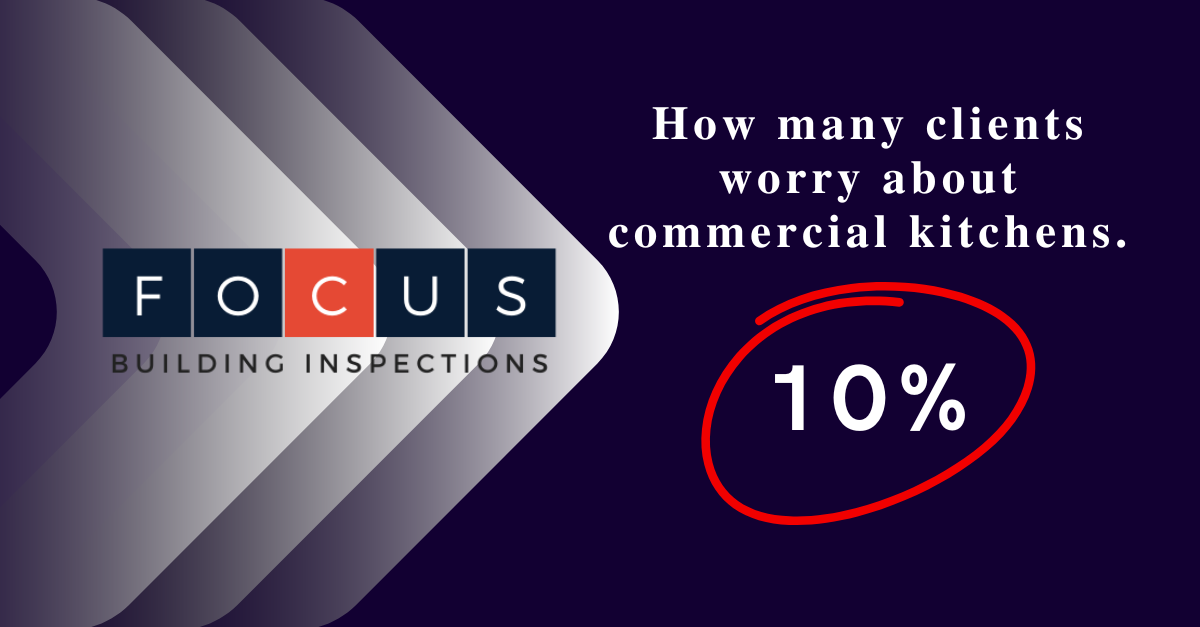What You Need to Know About Commercial Kitchens
10% of Our Clients Are Concerned About Commercial Kitchen Appliances — Here’s What You Need to Know
While not every commercial building has a kitchen, for those that do—like restaurants, cafes, catering businesses, or commissaries—the condition of commercial kitchen appliances is critical. In fact, 10% of our clients specifically cite concern about commercial kitchen appliances when scheduling inspections. Why? Because even a minor malfunction in one appliance can create health hazards, disrupt operations, and cost thousands in lost revenue.
In this blog, we’ll break down:
Why commercial kitchen appliances are a legitimate concern
5 common issues we find during inspections
What our commercial inspection covers in kitchen appliance areas
How to extend the life and performance of your food service equipment
Let’s get cooking on what commercial kitchen stakeholders really need to know.
Why Commercial Kitchen Appliances Deserve Special Attention
For any facility that relies on food prep or service, appliances are the engine of the business. But unlike typical residential units, commercial appliances operate at a higher intensity, face stricter health codes, and often fall under local fire safety regulations.
Here’s why commercial kitchen clients should be concerned:
1. Equipment Breakdowns Can Shut Down the Business
If the range stops working, the refrigeration fails, or the hood won’t ventilate—operations come to a halt. Downtime is costly, especially in food service where spoilage and health violations are on the line.
2. Poor Maintenance Leads to Fire Risk
Grease buildup, malfunctioning pilots, or faulty electrical components in ovens, fryers, and griddles can create serious fire hazards. Without regular cleaning and inspection, risk escalates quickly.
3. Used Equipment May Be Near End-of-Life
Many kitchens are sold with equipment already in place—but with unknown service history. Buying a commercial property with “included” kitchen appliances can be a major liability if they’re outdated or unsafe.
4. Health Department Compliance Is Mandatory
Appliances that aren’t functioning properly or that make sanitation difficult (e.g., cracked prep coolers, leaking dish machines, etc.) can result in point deductions or closures during inspections.
5. Appliances Are Expensive to Replace
Refrigerators, combi-ovens, dish machines, hood systems, and fryers all carry a hefty price tag—ranging from several thousand to tens of thousands of dollars depending on brand, size, and compliance features.
5 Common Commercial Kitchen Appliance Problems We Find
Here are some of the most frequent appliance-related issues we document during commercial property inspections:
1. Non-Functional or Poorly Maintained Equipment
We often find walk-in coolers that don’t maintain temperature, ovens with cracked doors, broken gaskets, or fryers with ignition issues. Many of these items require immediate repair—or are simply beyond their useful life.
2. Improper Hood Ventilation or Makeup Air
Hood systems must properly capture and vent smoke, grease, and steam. We often find unbalanced systems, inadequate makeup air, or fans that don’t operate. This causes indoor air quality and fire safety issues.
3. Grease Buildup and Fire Risk
Fryers, ranges, and griddles often have significant grease accumulation behind, under, or above the equipment—especially around filters and ducts. This is one of the most serious fire risks in a commercial kitchen.
4. Dish Machine and Drainage Issues
Dishwashers and sinks frequently have clogged drains, leaking pipes, or missing air gaps. Water temperature might be insufficient for sanitization—triggering health code violations.
5. Outdated or Missing Safety Features
We sometimes find gas appliances without proper shutoff valves, ranges without flame failure protection, or missing interlocks on exhaust hoods. These are critical safety and code violations.
What Our Commercial Inspection Includes for Kitchen Appliances
While we don’t perform performance testing or maintenance servicing on commercial appliances, we do assess and document the overall condition, installation quality, and associated risks.
✔ Visual and Functional Checks
We inspect each installed appliance for visible damage, cleanliness, operational status (if powered on), and signs of misuse. This includes ranges, fryers, ovens, griddles, refrigeration, dish machines, and food prep sinks.
✔ Exhaust and Ventilation System Review
We evaluate hood systems, including ducting, makeup air, and filter cleanliness. We check for visible grease buildup, operability of fans, and proper clearance from combustibles.
✔ Gas and Electrical Safety
We observe accessible connections for leaks, corrosion, improper flexible lines, and missing shutoffs or strain reliefs. We check if appliances appear grounded and appropriately wired.
✔ Fire Suppression Readiness
We verify whether kitchen hoods are equipped with fire suppression nozzles and check if the system appears intact and tagged. If not, we recommend evaluation by a licensed fire protection contractor.
✔ Health and Sanitation Risks
We note corrosion, mold, or food debris buildup inside and around appliances, as well as any signs that pest activity may be present in hard-to-clean areas.
✔ Reporting and Recommendation
We identify aging, unsafe, or poorly installed equipment, and recommend follow-up with licensed appliance technicians, fire suppression contractors, or sanitation professionals as needed.
How to Keep Commercial Kitchen Appliances Safe, Compliant, and Operational
Here’s what commercial property owners and operators can do to preserve appliance life and reduce liability:
➤ Set a Routine Cleaning and Maintenance Schedule
Daily cleaning, weekly filter changes, and monthly grease trap service are essential. Also ensure quarterly deep-cleaning of hoods, behind equipment, and ductwork.
➤ Have Equipment Professionally Serviced
Every 6–12 months, bring in appliance technicians to service and calibrate key equipment. Fryers, dishwashers, ovens, and refrigeration units require preventive care to avoid costly repairs.
➤ Verify Code and Ventilation Compliance
Before buying or renovating, confirm that hood systems, gas appliances, and fire suppression components meet current code—especially for new use classifications (e.g., converting an office into a café).
➤ Document Service Histories
Maintain records of service calls, cleanings, filter replacements, and fire suppression inspections. These help you stay compliant and make your property more attractive to buyers or tenants.
➤ Replace Failing Units Before They Break Down
Appliances don’t last forever. Ranges: ~15 years. Dish machines: ~10 years. Walk-ins: ~15–20 years. Don’t wait until they break mid-shift—plan replacements before they disrupt operations.
Conclusion: When the Kitchen Fails, So Does the Business
Commercial kitchen appliances are the backbone of any food-service operation. While only 10% of clients bring them up during inspection scheduling, the consequences of poor appliance condition are often underestimated—until it’s too late.
Whether you're purchasing a restaurant, leasing out a retail space with a prep kitchen, or managing a commissary for delivery services, appliance readiness and safety should always be on the checklist.
Need a Commercial Kitchen Evaluation?
In a commercial kitchen, even one failing appliance can grind operations to a halt, endanger lives, or trigger a costly health code violation. Only 10% of clients cite kitchen appliance concerns during inspections—but those who do are protecting their business from the heat.
At Focus Building Inspections, we help you assess the condition, safety, and compliance of your kitchen equipment so you can make smart, informed decisions before it’s too late. A safer, cleaner, and more compliant kitchen starts with clarity—and we’re here to deliver it.
Schedule a commercial inspection with us or contact our team. We’ll document appliance conditions, ventilation systems, and safety hazards—so you can make an informed investment with your eyes wide open.
Questions This Article Answers
Why are commercial kitchen appliances a significant concern during property inspections?
What are the consequences of equipment failure in food-service operations?
What fire and health risks are associated with poorly maintained kitchen appliances?
What common problems are found with commercial kitchen equipment during inspections?
How does grease buildup contribute to fire hazards in kitchens?
What is included in Focus Building Inspections’ commercial kitchen appliance evaluations?
How can commercial kitchen owners extend the life of appliances?
What safety features should commercial kitchen appliances have?
Why is documentation of maintenance history important for buyers and operators?
How often should commercial kitchen appliances and ventilation systems be serviced?
Bibliography / Resources
International Association of Certified Home Inspectors. (n.d.). Commercial kitchen inspection resources. InterNACHI. Retrieved April 25, 2025, from https://www.nachi.org/comsop.htm
National Fire Protection Association. (2017). NFPA 96: Standard for ventilation control and fire protection of commercial cooking operations. NFPA. Retrieved April 25, 2025, from https://www.nfpa.org/codes-and-standards/all-codes-and-standards/list-of-codes-and-standards/detail?code=96
National Restaurant Association. (n.d.). Equipment maintenance best practices for foodservice operations. NRA. Retrieved April 25, 2025, from https://restaurant.org/education-and-resources/resource-library/equipment-maintenance-best-practices
Occupational Safety and Health Administration. (n.d.). Commercial kitchen safety guidelines. OSHA. Retrieved April 25, 2025, from https://www.osha.gov/etools/commercial-kitchens
U.S. Food and Drug Administration. (2022). Food code guidelines. FDA. Retrieved April 25, 2025, from https://www.fda.gov/food/fda-food-code/food-code-2022



